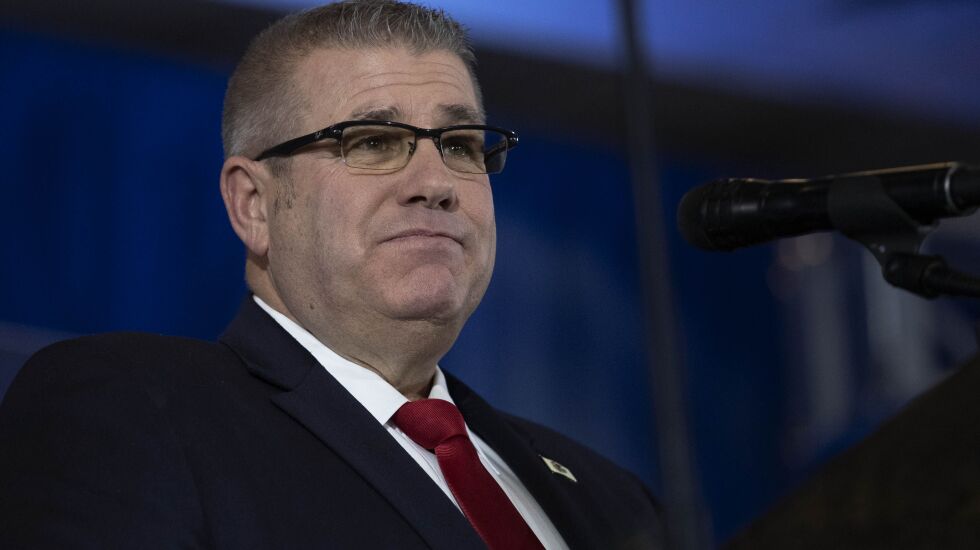
Democratic Gov. J.B. Pritzker won his reelection bid over Republican downstate state senator Darren Bailey — in a decisive victory that also clears a path to any future political aspirations.
The Associated Press called the race at 7 p.m., based on exit polling. Roughly five hours later, with just over 79% of precincts reporting, Pritzker led Bailey 55% to 42.1%. Pritzker took the stage to deliver a victory speech at 8:13 p.m., citing networks calling the race.
“I am so thrilled to spend four more years as your governor,” Pritzker said to cheers.
In a fiery speech reminiscent of his political addresses that have sparked presidential speculation, Pritzker took direct aim at MAGA Republicans, saying he’d defend Illinois at all costs when it comes to abortion rights.

Bailey was endorsed by former President Donald Trump in the primary, but took pains not to discuss Trump during the general election.
“Anyone who thinks they can come into this state and try to force some right-wing, MAGA war on a woman’s body, you will never get an inch of Illinois,” Pritzker said.
In prepared remarks sent to reporters, Pritzker had planned to say Bailey had conceded, and it was a sign that democracy works. That appeared to be a slightly rosy scenario. Bailey had not conceded at the time of Pritzker’s speech — and he waited nearly 90 minutes to do so.
Pritzker’s campaign later confirmed Bailey did finally admit defeat around 9:38 p.m., just minutes before the Republican took to the stage to address his own supporters in Springfield.
“There’s no nice or easy way to say this, but until the Republican Party is ready to expel the extremists in their midst, we need to do it for them at the ballot box,” Pritzker told his supporters in Chicago. “The fight for democracy, the fight for freedom, the fight for liberty, the fight for decency should be peaceful but not be timid. It needs to be out loud. It should afford no politician a convenient rhetorical hiding place.”
A crowd of more than 250 people gathered inside the Great Lakes Ballroom at the Marriott Marquis for Pritzker’s election night party. Loud cheers went up when AP called the election for Pritzker, with supporters waving flags and signs and chanting, “J.B.! J.B.!”
In Springfield, the race was called by AP before Bailey’s election party began, as supporters were still tricking in. It happened so early, supporters didn’t appear to even realize it and didn’t react.
Bailey took to took to the stage at about 9:44 p.m., just minutes after “Sweet Home Chicago” blared from the public address system at the Crowne Plaza Springfield.
“This isn’t part of this speech, but there’s still room for a miracle, friends,” Bailey told the crowd. “Still room for a miracle until all the votes are counted.”
But in the next breath, the Republican farmer from southern Illinois admitted the night did not go as he had hoped. He said he called Pritzker to congratulate him on his victory, but vowed to remain part of the “opposition.”
“J.B. Pritzker you need to be better,” Bailey said.

Pritzker did his best — in words and in millions of dollars worth of ads — to paint Bailey as an extremist who was too dangerous to serve as the state’s governor. The Democrat zeroed in on Bailey’s staunch opposition to abortion and his support of Trump.
But Bailey was hoping to ride a wave of discontent in the state, especially those unhappy with President Joe Biden and the economy.
Four years ago, Pritzker sent Republican Gov. Bruce Rauner packing by nearly 16 percentage points. In terms of raw votes, Pritzker in 2018 received more than any Illinois gubernatorial candidate since 1976.
In the waning weeks of the campaign, Bailey did his best to pick up votes in Chicago and the collar counties as Republicans across the country were gaining momentum. Bailey has called Chicago everything from “hellhole” to an “unruly child” to the “OK Corral.” He often said Pritzker’s policies were destroying the city and causing out of control crime — following a GOP playbook of pinning crime on Democratic leaders.

Establishment Republicans in the state are still miffed that Pritzker and the Democratic Governors’ Association spent millions in ads boosting Bailey in the Republican primary — a plan that helped Pritzker choose his primary opponent in a crowded field.
After decisive legislative wins in his first year, Pritzker, like many of the country’s governors, was forced to switch gears and lead the state’s pandemic response — trying to save lives while also creating enemies with his mandates and stay-at-home orders.
It was the pandemic that helped to spur a movement led by Bailey and his supporters. But the seeds had already been planted back in 2018, when the staunchly conservative former state representative Jeanne Ives nearly defeated Rauner in the Republican primary.
Although Pritzker’s team has been coy about his future, political speeches in New Hampshire and Florida have sparked speculation he’s considering a presidential run. The governor is also pushing for Chicago to host the Democratic National Convention, another sign there’s a trial balloon out there to see if Democrats view him as a presidential contender.
Contributing: Alex Degman, WBEZ statehouse reporter







